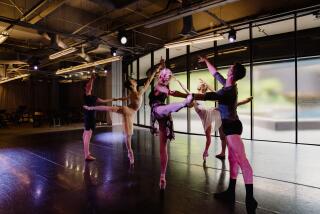A ‘Yes, You Can’ Story
- Share via
Wearing faded blue jeans and a black muscle shirt, a single hoop earring and a baseball cap on backward, Carlos Acosta takes the stairs two at time. On the upper floor of his old school, he swaggers through the hall, nodding, laughing, high-fiving his friends.
If appearances were to trusted, Acosta might be mistaken for someone’s older brother on lunch break from the car wash. Or a homeboy doing a quick detour from a street corner in a tough part of town.
Carlos Acosta is one tough guy all right, from the brim of his baseball cap to the tips of his ballet slippers.
It’s Sunday night, and I’m watching a TV segment about this young man, a most unlikely star in a recent production of London’s Royal Ballet Company. It’s a story as incredible as it is wonderful.
Several years ago on the island of Cuba, 9-year-old Carlos was a troublemaker. Stealing. Skipping school. All he wanted from life back then was to hang with his barrio buds and their black-market boom boxes. But his father, a truck driver, had other ideas. Worried that his born-to-be-wild child would too soon end up dead or in prison, he enrolled Carlos in Cuba’s state-run ballet school, a rigorous program that recognizes and nurtures dance talent.
Carlos was not happy about this. In the rough, ramshackle neighborhood where he grew up, the prevailing attitude toward ballet dancers was “real men don’t wear tights.”
In the beginning, his resistance to the idea of being a ballet dancer nearly rivaled his raw talent.
But his dad wouldn’t let him quit. And eventually, tough guy Carlos was won over by the sheer athleticism of this art. At age 16, he won first place in an international competition, and from there his world just opened up. A world of work, sweat, stage lights and standing ovations.
The TV piece went on to chronicle Acosta’s recent triumphs, comparing him with the greatest dancers. In the final scene, he performs before the queen of England. He’s leaping as if gravity were just some silly theory. You half-expect to see sparks flying from his toe shoes. Who would have imagined that a punk kid from Havana would be dancing with the best? Leaping high for high society?
“It is the irony of my life,” says Acosta, with a dazzling grin and a Desi Arnaz accent.
If Carlos’ father and teachers had been less demanding, or Carlos more stubborn, the world would never have known this young man’s gifts. The fact that he is there, on that London stage, is due to a combination of circumstances that could very easily not have happened.
Instead of dancing for royalty, it’s far more likely his life could have been one long pas de deux with the police.
I wonder about other talents in this world that remain undiscovered. Perhaps that ticket taker at the multiplex would have become another Matisse, had someone given him a box of paints for his 10th birthday. Maybe deep within that kid there with the green hair and nose ring is an eloquence that could one day change the world, if only someone would listen now. Perhaps the clerk at the checkout stand in the grocery store actually has the kind of mind that could find a cure for cancer, though these days making the rent gets most of her attention.
Seeing Carlos Acosta dance underscores the power and responsibility of potential. The most important thing for parents, educators, society in general to do is to help each individual tap into that talent, to see that those gifts, whatever they might be, get what they need to grow--not only for the sake of tough guys like Carlos Acosta but for the greater good of us all.
More to Read
The biggest entertainment stories
Get our big stories about Hollywood, film, television, music, arts, culture and more right in your inbox as soon as they publish.
You may occasionally receive promotional content from the Los Angeles Times.










